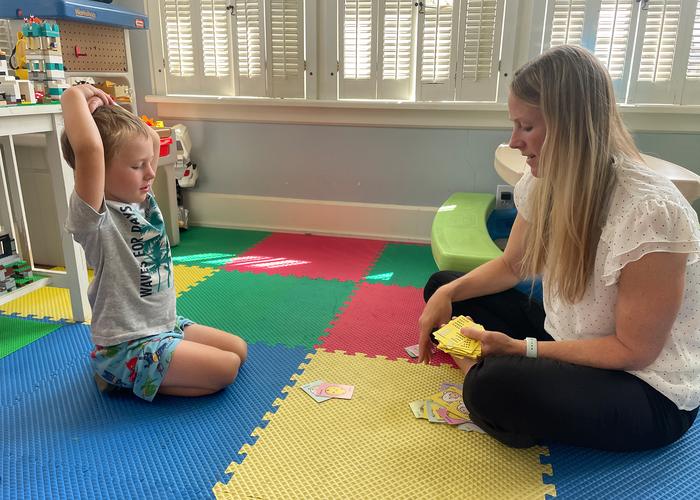COLUMBUS, OHIO – Is the status of “perfect parent” attainable?

Credit: The Ohio State University College of Nursing
COLUMBUS, OHIO – Is the status of “perfect parent” attainable?
Researchers leading a national dialogue about parental burnout from The Ohio State University College of Nursing and the university’s Office of the Chief Wellness Officer say “no,” and a new study finds that pressure to try to be “perfect” leads to unhealthy impacts on both parents and their children.
The survey of more than 700 parents nationwide from June 15 – July 28, 2023 is summarized in the new report, “The Power of Positive Parenting: Evidence to Help Parents and Their Children Thrive.” The data shows that:
- Fifty-seven percent (57%) of parents self-reported burnout.
- Parental burnout is strongly associated with internal and external expectations, including whether one feels they are a good parent, perceived judgment from others, time to play with their children, the relationship with their spouse and keeping a clean house.
- The more free play time that parents spend with their children and the lighter the load of structured extracurricular activities, the fewer mental health issues in their children (i.e. anxiety, depression, OCD, ADHD, bipolar disorder).
- Parents’ mental health and behaviors strongly impact their children’s mental health. If their children have a mental health disorder, parents report a higher level of burnout and a greater likelihood for them to insult, criticize, scream at, curse at and/or physically harm their children (i.e. repeated spanking). Higher levels of self-reported parental burnout and harsh parenting practices are associated with more mental health problems in children.
Kate Gawlik, DNP, one of the lead researchers on the study who pursues this research based on her experience as a working mother of four, said the illusion and expectations of “perfect parenting” can be deflating.
“I think social media has just really tipped the scales,” said Gawlik, an associate clinical professor at the Ohio State College of Nursing. “You can look at people on Instagram or you can even just see people walking around, and I always think, ‘How do they do that? How do they seem to always have it all together when I don’t?’
“We have high expectations for ourselves as parents; we have high expectations for what our kids should be doing. Then on the flipside, you’re comparing yourself to other people, other families, and there’s a lot of judgment that goes on. And whether it’s intended or not, it’s still there.”
Data from the study shows that force of expectations from what Gawlik calls a “culture of achievement” leads to burnout (a state of physical and emotional exhaustion), which in turn leads to other, potentially debilitating issues.
“When parents are burned out, they have more depression, anxiety and stress, but their children also do behaviorally and emotionally worse,” said Bernadette Melnyk, PhD, FAAN, vice president for health promotion and chief wellness officer at Ohio State. “So it’s super important to face your true story if you’re burning out as a parent and do something about it for better self-care.”
Gawlik and Melnyk’s new report brings critical updates to their initial study in 2022, which measured working parent burnout during the height of the COVID-19 pandemic. Gawlik and Melnyk created a first-of-its-kind Working Parent Burnout Scale, a 10-point survey that allows parents to measure their burnout in real time and use evidence-based solutions to help.
That scale is included in the new report, along with new guidance on positive parenting strategies, techniques and tips to form deeper connections with one’s children.
“Positive parenting is when you give your children a lot of love and warmth, but you also provide structure and guidance in their life,” Melnyk explained. “You gently teach them consequences of behaviors. So that is a much better goal to shoot for being a positive parent than a perfect parent.”
Among the strategies:
- Connection and active listening
- Catching, checking and changing negative thoughts into positive ones
- Readjusting expectations for the parent and the child
- Reflecting and acting on priorities
“If maybe you’re prioritizing making sure your house is spotless all the time, but then you don’t feel like you have time to go for a walk every night with your children, maybe you need to reorganize or find a way to make both of those things work,” Gawlik suggested.
Melnyk said these evidence-based approaches can help calm what she calls a “public health epidemic” of parental burnout.
“Parents do a great job caring for their children and everybody else, but they often don’t prioritize their own self-care,” Melnyk said. “As parents, we can’t keep pouring from an empty cup. If children see their parents taking good self-care, the chances are they’re going to grow up with that value as well. It has a ripple effect to the children and to the entire family.”
“As one parent told me,” Gawlik added, “‘I would much rather have a happy kid than a perfect kid.’”
-30-
Method of Research
Survey
Subject of Research
People




